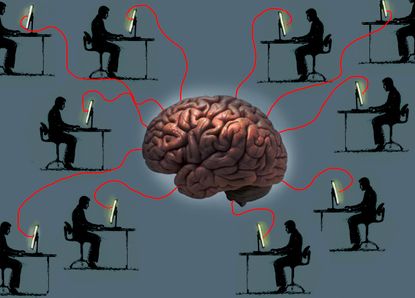How the 2016 election is messing with your brain
Fear is an effective way to win votes, but it's really bad for our mental health


If there's one unifying theme to be found in this crazy election season, it's fear.
From Donald Trump's dire warnings about undocumented immigrants to Hillary Clinton's thinly veiled suggestion that Trump would lead us into nuclear war, everything about this cycle seems apocalyptic. Aside from making us want to turn off the TV and perhaps hide under a rock, all this fear has a more sinister effect: It's messing with our brains.
"Fearmongering during presidential elections is par for the course," psychotherapist Jonathan Alpert, author of Be Fearless: Change Your Life in 28 Days, told The Week. "Scaring people into believing their opponent is bad, racist, trigger happy, hid important emails, will deport people, etc. are all part of a normal campaign. … By instilling fear into people's minds, it creates doubt and uncertainty."
Subscribe to The Week
Escape your echo chamber. Get the facts behind the news, plus analysis from multiple perspectives.

Sign up for The Week's Free Newsletters
From our morning news briefing to a weekly Good News Newsletter, get the best of The Week delivered directly to your inbox.
From our morning news briefing to a weekly Good News Newsletter, get the best of The Week delivered directly to your inbox.
And 2016 has been a particularly fearmonger-y election.
Clinton and Trump are the least likeable presidential nominees in modern memory. And because they're so unlikeable, they're trying to win votes by painting each other as the worst of two evils. "We have politicians who are effectively demagogues," explains Harvard psychologist Susan David for Big Think, "who aim to inspire fear and cement our bond to them by hyperbolizing a threat to our mortality."
It's an effective tactic if you want to win votes. "Fear is easy," GOP strategist Rick Wilson told Molly Ball at The Atlantic. "Fear is the simplest emotion to tweak in a campaign ad. You associate your opponent with terror, with fear, with crime, with causing pain and uncertainty."
The fear factor is now so high that many Americans are actually afraid of both presidential candidates. Fifty-six percent of Americans are afraid of a Trump presidency, and 48 percent fear a new President Clinton, according to an Associated Press/GfK poll. Nearly one-fourth of Americans are scared of both options.
And all this panic is messing with our mental health.
Fear is a chain reaction in the brain, one that begins when you see or hear something frightening, and ends with your body going into fight-or-flight mode. Depending on how life-threatening the frightening thing is, your brain will either turn up your adrenal glands and rush blood to your muscles or heighten your senses. Your brain will also trigger feelings of dread, anxiety, and panic. All this happens in fractions of a second, automatically preparing your body to either flee the danger or stay and fight.
The swiftness of that fear reaction is intended to protect you. But sometimes it goes into overdrive — especially if you're repeatedly bombarded by fearful messages. "Once the fear pathways are ramped up, the brain short-circuits more rational processing paths and reacts immediately to signals from the amygdala," explains the University of Minnesota's Center for Spirituality & Healing. "When in this overactive state, the brain perceives events as negative and remembers them that way."
That can create fragmented fear memories, which trigger the full gamut of emotional and physical responses at anything that reminds you of the initial fear stimulus. When that happens, you're vulnerable to experiencing PTSD.
Over time, being in constant fear can also impair the creation of long-term memories and cause constant anxiety, fatigue, and chronic depression. Prolonged anxiety has been linked to premature death, and chronic fear has been linked to a long list of other harmful side effects:
[F]ear can interrupt processes in our brains that allow us to regulate emotions, read non-verbal cues and other information presented to us, reflect before acting, and act ethically. This impacts our thinking and decision-making in negative ways, leaving us susceptible to intense emotions and impulsive reactions. [University of Minnesota's Center for Spirituality & Healing]
Psychotherapist Jonathan Alpert sees the effects of the 2016 election on his patients. "Since Super Tuesday, I've had a growing number of patients talk to me about their anxiety and unease over Trump," Alpert wrote in his Huffington Post column.
So, how can we escape the 2016 election cycle without becoming hardened, anxiety-riddled shells of humans?
For starters, know this: Fear is a choice. It may not seem like it, but you have power over your fear. You just need to make the decision not to be afraid of something that frightens you. Alpert told The Week he encourages his patients to "separate fact from fiction and to focus on things that are within their control, not beyond it." So rather than freaking out about warnings of impending terror attacks, recognize that you're letting your fear fill your head with a worst-case scenario that's neither particularly realistic nor within your control. You can also limit your exposure to whatever's freaking you out to decrease its effect on you, i.e., watching less news coverage of the election.
Another option: Practice power breathing. Taking deep slow breaths helps stimulate acetylcholine, a neural "tranquilizer that you can self-administer," says Psychology Today.
Award-winning rocket scientist Olympia LePoint offers three more tips: "You must name and reject your fear. You must reprogram your brain with different thoughts. You must rebuild the neurons in your brain to take action." She elaborates in her TED talk:
Anytime someone has fear, problem-solving is completely turned off. But when we take action in direct opposition from our fears something amazing happens. Neuron transmitters are created and built within our brain, turning off fear, creating pathways to fire off our frontal brain lobes. And when our frontal brain lobes fire off, we're able to do great things. [Olympia LePoint]
By identifying the thing that frightens you and refusing to let it rattle you, you open yourself to thinking healthier thoughts and, ultimately, taking healthier actions to overcome your fear. "Exercise [your] brain by taking action in direct opposition to [your] fear," LePoint says.
So get out there and fight that fear-mongering! Or at least turn the TV off.
Create an account with the same email registered to your subscription to unlock access.
Sign up for Today's Best Articles in your inbox
A free daily email with the biggest news stories of the day – and the best features from TheWeek.com
Laurie Vazquez is a science and tech writer whose work has appeared in Popular Science, Big Think, TIME, and other publications. She's also a children's author and playwright.
-
 Nigeria's worsening rate of maternal mortality
Nigeria's worsening rate of maternal mortalityUnder the radar Economic crisis is making hospitals unaffordable, with women increasingly not receiving the care they need
By Harriet Marsden, The Week UK Published
-
 'Elevating Earth Day into a national holiday is not radical — it's practical'
'Elevating Earth Day into a national holiday is not radical — it's practical'Instant Opinion Opinion, comment and editorials of the day
By Harold Maass, The Week US Published
-
 UAW scores historic win in South at VW plant
UAW scores historic win in South at VW plantSpeed Read Volkswagen workers in Tennessee have voted to join the United Auto Workers union
By Peter Weber, The Week US Published
-
 Arizona court reinstates 1864 abortion ban
Arizona court reinstates 1864 abortion banSpeed Read The law makes all abortions illegal in the state except to save the mother's life
By Rafi Schwartz, The Week US Published
-
 Trump, billions richer, is selling Bibles
Trump, billions richer, is selling BiblesSpeed Read The former president is hawking a $60 "God Bless the USA Bible"
By Peter Weber, The Week US Published
-
 The debate about Biden's age and mental fitness
The debate about Biden's age and mental fitnessIn Depth Some critics argue Biden is too old to run again. Does the argument have merit?
By Grayson Quay Published
-
 How would a second Trump presidency affect Britain?
How would a second Trump presidency affect Britain?Today's Big Question Re-election of Republican frontrunner could threaten UK security, warns former head of secret service
By Harriet Marsden, The Week UK Published
-
 'Rwanda plan is less a deterrent and more a bluff'
'Rwanda plan is less a deterrent and more a bluff'Instant Opinion Opinion, comment and editorials of the day
By The Week UK Published
-
 Henry Kissinger dies aged 100: a complicated legacy?
Henry Kissinger dies aged 100: a complicated legacy?Talking Point Top US diplomat and Nobel Peace Prize winner remembered as both foreign policy genius and war criminal
By Harriet Marsden, The Week UK Last updated
-
 Trump’s rhetoric: a shift to 'straight-up Nazi talk'
Trump’s rhetoric: a shift to 'straight-up Nazi talk'Why everyone's talking about Would-be president's sinister language is backed by an incendiary policy agenda, say commentators
By The Week UK Published
-
 More covfefe: is the world ready for a second Donald Trump presidency?
More covfefe: is the world ready for a second Donald Trump presidency?Today's Big Question Republican's re-election would be a 'nightmare' scenario for Europe, Ukraine and the West
By Sorcha Bradley, The Week UK Published